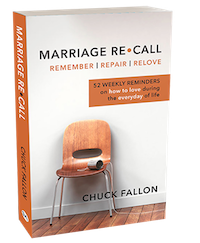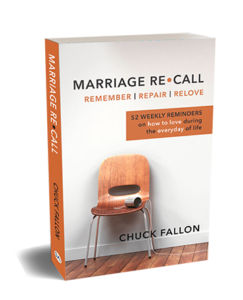Have you ever had a dream where you’re in front of a large audience and you don’t know what you’re supposed to do? Maybe you’re standing near a piano facing bright lights with a blank stare. It’s really more of a nightmare, isn’t it? You’re expected to perform, yet you have no idea what you’re supposed to play, or worse yet – how to play it! I think this nightmare is often experienced by married couples. They find themselves on stage with people waiting and watching. Yet, they know they don’t have a clue! I get nervous just writing this because I’ve been there!
Whether it’s musical, athletic or relational, we are a performance-oriented culture. I have no problem with people wanting to perform well. The key is that we need to take the time to learn before we can perform. When it comes to the arts or athletics, we totally get that concept. Most of us marvel at the athlete who gets up at 4 a.m. to train, or the musician who rehearses long after his piece is perfected. Why is it so difficult to grasp the need for training in order to perform well in relationships?
We can help inform our thinking about building healthy marriages with The Four Stages to Learning:
Stage One – Unconscious Incompetence
Let’s say I decide that I want to learn how to play the piano. I don’t know how, but I love the sound of a piano skillfully played and I can picture myself playing Christmas carols surrounded by friends and family.
This could also be called blissful ignorance, “We don’t know how much we don’t know”. This is where many of our premarital sessions start. We have an expected level of performance, but we don’t know how much training it will take to get there.
Stage Two – Conscious Incompetence
I begin taking piano lessons, learn scales and chords, practicing them over and over. I discover that my fingers don’t naturally move up and down the keys. I fumble, hit the wrong note and my confidence drops as I realize my ability is limited.
We feel uncomfortable because “We now know how much we don’t know.” At this point we might decide to quit. We believe we’ll never be good at the skill we’re trying to learn. It’s tempting to take the time and energy once spent learning and instead use it to avoid the shame of failing.
Stage Three – Conscious Competence
Even though it’s difficult, I continue taking piano lessons and have learned some songs. I perform for friends and family, but I really have to focus. I can’t engage in conversation while I play, and it’s really helpful if the kids aren’t running around and the lighting is good.
If you work through initial failure you proceed to Conscious Competence, “We now know how much we do know.” We are better at parenting or resolving conflict, but it feels forced because of the effort. We become anxious because we want to be done learning! Patience is essential because the finish line is just around the corner!
Stage Four – Unconscious Competence
If I persist, I find that I can finally perform my piano repertoire at will, and can even experience interruptions without worry. My hard work has established Unconscious Competence.
This final stage is where well-learned skills form habits, “We don’t know how much we do know.” Our confidence and ability have peaked. We can now engage in communication or conflict resolution and perform with polished confidence.
Why is it so difficult to grasp the need for training in order to perform well in relationships? When I work with couples, I often encourage them to take on the role of “spouse trainer” in their relationship. While there are many good resources on how to build a healthy marriage, nobody can teach your spouse the nuances of being married to you better than you. Do you know what stage you are in with different relational skills? Engage in the process of helping each other learn to become Unconsciously Competent as husband and wife.
If you need further assistance building the marriage of your dreams, give me a call. I am available for in-office or phone sessions throughout the week. However, I’m not available to play piano, that WOULD be a nightmare!




